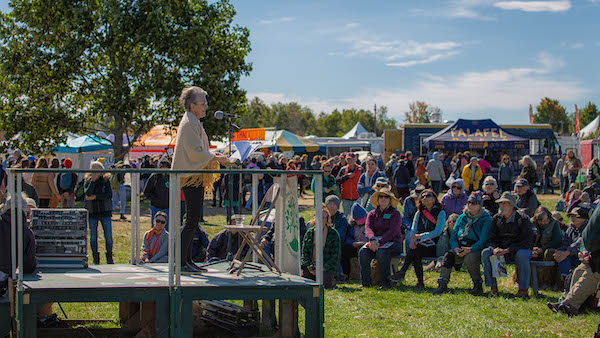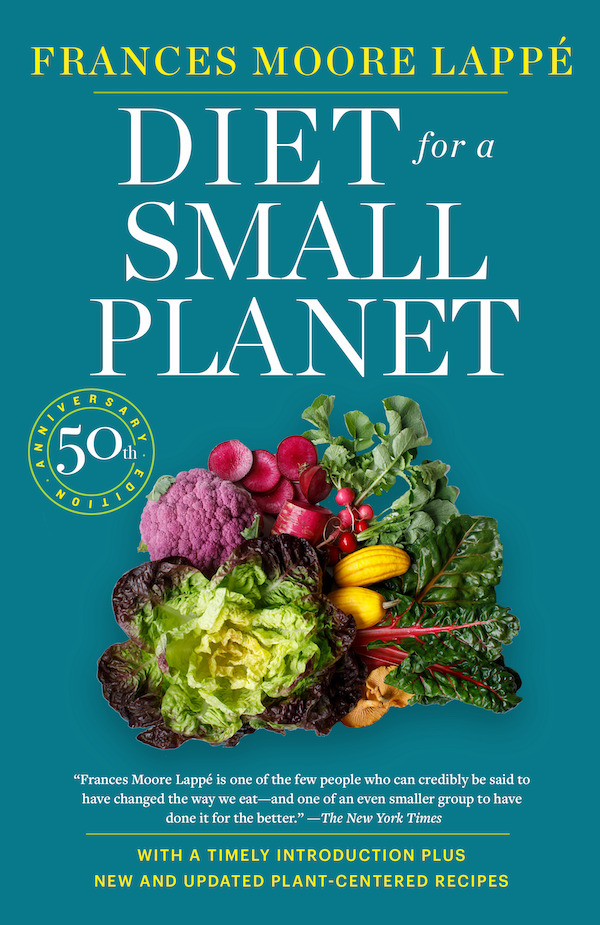By Frances Moore Lappé
Let me start by going back … way back. It’s 1969, and I am lost. I had signed up to be a warrior in our “war on poverty,” going door to door in Philadelphia’s poorest neighborhoods organizing for low-income women to get the help they were entitled to. But soon the person I became closest to, Lilly, died of a heart attack.
I was convinced Lilly really died not from a heart attack but, more accurately, from of the stress of poverty. I pledged to myself to dig to the rootof her death.
But I didn’t know how.

Soon, though, this thought popped … food! Our most basic need. If I began with the question “Why hunger?,” maybe I could unlock the mysteries of economics and politics and find my path.
At the time, the experts were warning that we’d run out of food and farmland. Really? I had to know — is it true? I dug in at the UC Berkeley agricultural library.
Soon I was shocked. There was plenty of food, and it’s more true today — despite the waste of one-third of production and the staggering inefficiency of meat-centered diets: Almost 80% of agricultural land is used to produce livestock that provide less than 20% of our calories. “Whoa,” I said, “that’s a protein factory in reverse.”
And now we face the climate consequence: If cattle were a country, it would be the sixth biggest greenhouse gas emitter!
Despite plenty for all, world-wide roughly 800 million of us still face hunger. And, for many who do get enough, we’ve turned eating into a health hazard … even a killer. Today, 67% of calories that American children and teens eat come from ultra-processed, nutrition-lacking foods. It’s one reason diabetes rates have skyrocketed.
And meat? In 2015 the World Health Organization deemed red meat a probable carcinogen and processed meat a carcinogen. Poor diets around the world are now implicated in diseases causing 1 in 5 deaths.
Plus, each year worldwide 44% of those who work the land experience at least one incident of acute pesticide poisoning.
So, we humans, supposedly the brightest species, are the only species to kill itself by feeding itself.
In my youth, it hit me: Food has special power — it connects us to our own health, the Earth, all who grow and eat … and climate, too. Our food system contributes as much as 37% of all greenhouse gases.
As my friend, the late German physicist Hans Peter Duerr, told me: in biological systems there are no parts, only participants.
Yes, our personal choices matter, but so do the rules we set as polities. Soon I began to say that hunger is caused not by scarcity of land or food, but by a scarcity of democracy.
I could hear my audiences thinking: Nice sound bite, lady, but whatis democracy that can end hunger? Isn’t America the world’s preeminent democracy, and we have hunger here?
A preeminent democracy? Well, no. America ranks way down at 62nd between Samoa and South Korea, reports Freedom House, founded by Eleanor Roosevelt and other eminent Americans.
Now, when I lament a “scarcity of democracy,” what do I mean?
To me, democracy means having an equal say, certainly in the realm of life’s essentials. If our voices are drowned out by the power of concentrated wealth, can we call it democracy? No.
And in farming, agribusiness in the past decade has seen “unprecedented consolidation.” Farmers depend on highly concentrated industries to buy what they produce: Four chicken giants control 60% of the market … and the beef market? Make that 85% controlled by four buyers. They dictate the terms.
Plus, today more than 1,000 agribusiness lobbyists spend nearly $82 million a year to shape policy in their interest.
And we taxpayers provide $6.25 billion yearly to subsidize commodity crops, such as corn and soybeans, that mainly end up in livestock feed and in nutrition-less foods —with the top 10% of producers getting most of that money.
Ok, now let’s take a deep breath!
For we are also in the midst of a great turn toward life, and you in Maine are leaders!
- Overall, organic farming is gaining fast — almost doubling in acreage in one recent decade. And Maine ranks second in organic acres per capita (behind our neighbor Vermont). Hat’s off to you!
- Organic food sales are rising faster than the general food market.
- USDA is putting $300 million into an “Organic Transition Initiative.”
- Farm-to-school programs have grown to more than 40,000.
- Since the mid-‘90s local farmers’ markets jumpedmore than a four-fold increase. Now they are almost 9,000.
There is much to celebrate, but we also know we have a long way to go.
So, what does embracing democracy as our root solution look like? First, the economic piece.
Among our founders, John Adams got it, writing: “Monopolized” property is a “curse to mankind,” and “equal liberty” requires every “member of society” to own land. Translated into 21st century reality would mean financial security as a basis of freedom, and healthy food would be a right. (I congratulate Maine for your Right to Food Initiative.)
Note that not that long ago — from the ‘40s to the early ‘70s — we were moving toward Adams’ “equal liberty,” as real family income doubled for every class, and the poor gained most.
Then, tragically, the story changed. Ronald Reagan proclaimed the “free market” is the solution. But no market is free. All have rules, and ours is set to ensure wealth gushing to the top. Now, three Americans control more wealth than the bottom half.
So, how did we get here?
Humans live by stories. What is the story that led us here?
Well … simply put: We are at base just selfish little shoppers. So, we best turn over our fate to an impersonal force — the market — in which the most industrious rise. And we all gain. Well no. We’ve ended up with income inequality more extreme than about 120 countries, putting us near Haiti.
So, life on our beautiful planet requires a new story: one creating conditionsthat accept the worst in us — keeping it in check — while bringing forth the best. And what are they? I see three.
One: Wide dispersion of power.
Two: Transparency in public affairs.
Three: A culture of mutual accountability, replacing today’s blame game. We accept that, because we’re all connected, we’re all implicated. Rabbi Abraham Joshua Hershel got it right: “Some are guilty but we’re all responsible.”
And the great news? This pathway enables honest hope.
Today, it motivates a historic “Movement of Movements” for democracy. Many Americans — whether focused on healthy food for all, racial justice, the environment, climate, you name it — now see that we can succeed only as America becomes a democracy in which citizens’ concerns count.
So, our Small Planet Institute is partnering with a huge network — Democracy Initiative — that brings together 75 organizations whose membership embraces 45 million Americans. Together we’ve created an online bridge where anyone can find a place in the democracy movement. It’s democracymovement.us.
So, jump on, click to Maine … and find six action organizations.
And what are the Democracy Movement’s immediate goals? Expanding and protecting voting rights, removing money’s power over our democracy and guaranteeing fair representation by unrigging.
Need extra motivation?
Democracy is not a dull duty. It is who we are. To thrive, we humans need power, meaning and connection. And we meet those core needs as we stand up for democracy. Yes! So, whatever one’s primary focus, we serve it by standing up for democracy. Specifically, for example, right now we can support Elizabeth Warren’s effort to end “abusive contract farming.”
Finally, let’s tackle a question that haunts many: Do we humans have what it takes for democracy? Yes!
One, a sense of fairness. All primates seem to have it. A study shows Capuchin monkeys will throw their food back at the caregiver if they see a neighbor get a better treat!
Two, empathy. Even Adam Smith — the philosopher Reagan cited to argue that self-interest is the core human motive — said the opposite: “How selfish soever man may be supposed, there are evidently some principles in his nature, which interest him in the fortune of others, and render their happiness necessary to him, though he derives nothing from it except the pleasure of seeing it.”
Three, cooperation. Anthropologists find that the depth of our capacity for cooperation is what characterizes our species. We are the only primates capable of shared intentionality.
All true. But we do have a dangerous downside — a vulnerability to blame the other. It is one more reason democracy is so important. In work for democracy — well aligned with our nature — I give a big shout out for Maine. We as a nation are indebted to you for leadership in many areas. One is getting money out of the drivers’ seat, as when in 2000 Maine was one of the first two states to enable legislative candidates to fund their campaigns with public money.
This is what democracy looks like. Thank you, Maine!
What’s most needed from us now?
Note: optimism is not required! What humans need to act is a sense that their action could make a difference. All we need to know is that it is at least possible that our acts count. So, I say, I’m not an optimist. I’m a possibilist!
Yet, something else is required.
In such an era, goodness is not good enough. Courage is our call. And how do we stoke courage? Eleanor Roosevelt nailed it: Do one thing every day that scares you.
A brave Kenyan minister once gave me a gift. Fear, he told me, is simply energy. It is energy we can use as we choose. That pounding heart? I renamed it my “inner applause” cheering me on. And … because we’re social creatures, our courage Is contagious.

So where is our power? It is right here, right now. It is your vision, determination, your courage. It is in your buddies pushing you to do what you thought you could not do.
That is your power. Glory in it. We humans were made for this challenge! As inaugural poet Amanda Gorman puts it:
The new dawn blooms as we free it.
For there is always light,
if only we’re brave enough to see it.
If only we’re brave enough to be it.
Frances Moore Lappé is the author or coauthor of 20 books, many focusing on themes of “living democracy.” Her first book, “Diet for a Small Planet,” published in 1971, has now sold three million copies, and the 50th anniversary edition was released in 2021. The recipient of 20 honorary degrees, she has been a visiting scholar at Massachusetts Institute of Technology (MIT) and University of California, Berkeley, and in 1987 received the Right Livelihood Award, often called the “Alternative Nobel.”
This essay is excerpted from her keynote speech at the 2022 Common Ground Country Fair in Unity, Maine. You can watch the keynote in its entirety at mofga.org/fair-keynote-speakers-2022.
This article was originally published in the winter 2022-23 issue of The Maine Organic Farmer & Gardener.

